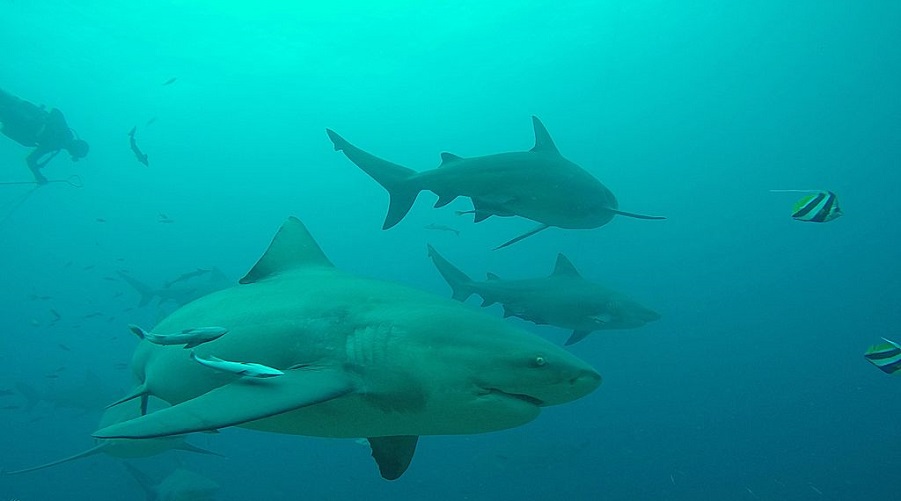
Bull shark (Carcharhinus leucas). Photo by amanderson2, Wikimedia Commons
Nearly two-thirds of coral reef shark and ray species worldwide are threatened with extinction, a new study in Nature Communications co-authored by the Sea Around Us’ Maria ‘Deng’ Palomares shows.
The results suggest that the extinction risk of coral reef sharks and rays, as a percentage of threatened species, is almost double that of all 1,199 known shark and ray species. The findings highlight the need for immediate conservation action for these species through local protections, fisheries management and enforcement, and Marine Protected Areas.
Coral reefs are one of the most at-risk ecosystems from global climate change. Sharks and rays are crucial for these ecosystems to function and cover a range of ecological niches; from filter feeders to apex predators. Although overfishing has previously been attributed to steep declines in some populations, there are still questions about the global status of sharks and rays living in coral reefs.
Using the International Union for Conservation of Nature (IUCN) Red List of Threatened Species, lead authors Samantha Sherman and Colin Simpfendorfer, together with Dr. Palomares and other colleagues, evaluated the extinction risk of all 134 coral reef-associated shark and ray species. They also compared their status with all other coral reef species.
The authors found that 59% of coral reef shark and ray species are threatened with extinction, including the critically endangered whitefin topeshark (Hemitriakis leucoperiptera), and the endangered coach whipray (Himantura uarnak), making them the most threatened group in the world, other than marine mammals.
They also found that fishing was the main threat to these species, compounded by habitat loss and climate change. Extinction risk was found to be greatest for widely distributed large species, like the vulnerable bull shark (Carcharhinus leucas) and endangered reef manta ray (Mobula alfredi), both found in the waters of over 60 countries, and in nations with greater fishing pressure and weaker governance, like Brazil, Tanzania, and Indonesia.
The findings suggest that without action to improve the conservation of sharks and rays on coral reefs, declines could have serious consequences for the health of these ecosystems and the hundreds of millions of people in coastal communities that rely on them.
To read the full paper visit https://www.nature.com/articles/s41467-022-35091-x

